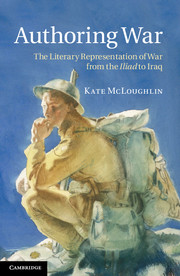Introduction: Authoring war
Published online by Cambridge University Press: 01 June 2011
Summary
In War and Peace (1865–9), Nikolai Rostov responds enthusiastically to a request from Boris Drubetskoy to describe how and where he got his wound:
He described the Schön Graben affair exactly as men who have taken part in battles always do describe them – that is, as they would like them to have been, as they have heard them described by others, and as sounds well, but not in the least as they really had been. Rostov was a truthful young man and would never have told a deliberate lie. He began his story with the intention of telling everything exactly as it happened, but imperceptibly, unconsciously and inevitably he passed into falsehood. If he had told the truth to his listeners who, like himself, had heard numerous descriptions of cavalry charges and had formed a definite idea of what a charge was like and were expecting a precisely similar account from him, either they would not have believed him or, worse still, would have thought Rostov himself to blame if what generally happens to those who describe cavalry charges had not happened to him. He could not tell them simply that they had all set out at a trot, that he had fallen off his horse, sprained his arm and then run from the Frenchman into the woods as fast as his legs would carry him. Besides, to tell everything exactly as it had been would have meant the exercise of considerable self-control to confine himself to the facts. It is very difficult to tell the truth and young people are rarely capable of it. […]
- Type
- Chapter
- Information
- Authoring WarThe Literary Representation of War from the Iliad to Iraq, pp. 1 - 20Publisher: Cambridge University PressPrint publication year: 2011



